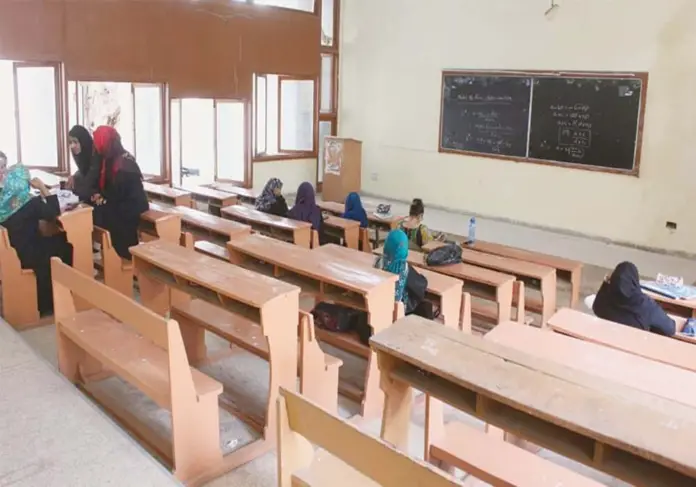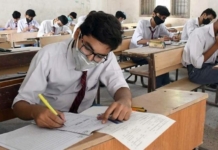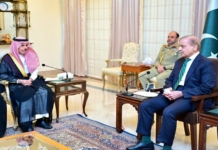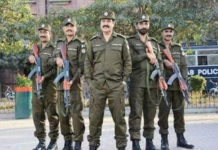The Pakistan Tehreek-e-Insaf (PTI) government rose to power with claims that it would bring reforms in the system besides revolutionizing the education and health sectors. Let alone civil service reforms, nothing special has happened in the education system except for the shifting of administrative departments from the Civil Secretariat.
As per the documents, the Punjab government has decided to shift both of the education departments – Higher Education and School Education – from the main Secretariat to Lawrence Road. A plaza has been purchased to house these offices there. As per an official letter addressed to both the education secretaries, the chief secretary has directed them to shift there. The HED would be on the first, second and third floors while SED on the basement, ground, fourth and fifth floors.
The Higher Education Department (HED) is situated at Main Secretariat while the School Education Department (SED) at the Old Planning & Development Building. Earlier, two Health Departments i.e Primary and Secondary Healthcare and Specialized Healthcare were also shifted from the Secretariat to Birdwood Road and Lawrence Road, respectively.
The PTI government had claimed that there would be a unique and universal education policy. Moreover, it also constituted a task force to bring massive reforms in the age-old colonial civil service. However, it could not add any feather in its cap other than introducing the single curriculum. It was a good step towards unity and nationalism.
In the health sector, health cards were issued across the province. The government claimed this initiative to be another of its achievements. When we discuss the education side there is no universal education policy that could revolutionize the ignored public sector institutions. All the colleges and universities are handling education in the traditional manner.
The private sector, compared to the public sector, has been leading in all the sectors, including education. Education has never been a priority area for governments, both dictatorship or democratic. A former SED secretary told this scribe that during over three years in power, the PTI could not bring sustained policies in the ignored education sector.
Though the government didn’t change ministers for the HED and SED but the secretaries were frequently transferred. Sometimes, the departments were run on a stop-gap arrangement.
Take the example of the present HED Secretary, Syed Javed Iqbal Bukhari. As he reaches superannuation, instead of posting a full-time secretary, the food department head was assigned additional charge of the HED office. From Imran Sikandar to Ghulam Farid many secretaries were transferred in the SED. The same was true for the HED.
Nazira education was another initiative. Though the government wanted to teach the Holy Quran by the existing teaching staff but the court directed recruiting separate Qaris for the purpose. The provincial government lacked science, mathematics and information technology teachers. It also lacked fully equipped science laboratories and early childhood education classrooms.
Moreover, when this paper talked to a senior teacher, Shahbaz Ali, he was of the view that the government has been recruiting “officials’, not teachers. They perform their duties just like other government employees and leave the premises. He said that there should be a mechanism to hunt real teachers from amongst the highly educated lot and there should be different merit for teachers.
While recruiting teachers, psychologists should advise the recruitment committees whether an aspirant is fit for the profession or not. Moreover, he was of the view that the teachers were depressed. He said that they were an ignored segment of society and that they themselves were also responsible for the sad state of affairs of the education system.
Iftikhar Ahmad, another teacher said that the primary job of the teacher was to motivate the students, but now we see that despite all-out efforts, enrollment in the government schools was on the decline. An education-friendly and productive environment in state-funded institutions should be ensured. He said that the government teachers are comparatively better paid as compared to the private sector teachers. But, he said that they themselves were deeply demotivated. They compare themselves with other segments like engineers, doctors and civil servants and fall victim to the inferiority complex.
Moreover, the governments engage teachers for extra-academic activities like census, election duties, enrollment of votes, examination duties and much more. There are no incentives for the real teachers who truly promote talent and motivate their students. They don’t only pass time rather prepare the students to be a good generation.
Tahira, a foreign-qualified college teacher, said that some teachers prefer to get involved in politics. These days, teachers are on the roads demanding an increase in their salaries, disparity allowance besides regularization of their services, and much more. Was it no crime for the teachers to be absent from their classes, she questioned. The loss of students did not bother them, she stated.
Moreover, the government should apply the newly notified directory retirement policy on the deadwood present in the community. Those who prefer politics to performance in schools should also be given show-cause notices, she demanded. The need she suggested is to introduce a conductive education system, developed in Hungary by András Petö. In this system, teachers or conductors teach children and adults with motor disorders to function independently. They guide them to attain their goals in their own way.
During former chief minister Shehbaz Sharif’s period, the education authorities’ were constituted at the district level. Even after many years, there was no vivid impact of those authorities as education remained centralized. The need was to devolve the decision-making to the district education authorities. They should have prepared their own educational plans but the school education department remained at the helm of affairs.
Babar Ali, a factory manager, said that the teachers were on the roads.
“They have announced to stage protest demonstrations outside the civil secretariat. There is, as it seems, no difference between the clerks and teachers because the way of demands is the same. Both chant slogans, hang banners and boycott their workplaces,” he stated. He added that the teachers should perform first then demand.
Ejaz Hussain, vice principal in Dar-e-Arqam School, said that there should be a very strict mechanism and criteria for the enrollment, training, regularization and promotion of teachers. He added that the government should also conduct a survey about the children of the government teachers, whether they were enrolled in the government sector schools or in the private sector.
Surprisingly, he held, the teacher community didn’t like to enroll their own children in government schools. “How can they motivate other parents to send their children to public sector schools,” Hussain raised a question. The government would have to surrender to the protestors, he predicted.
Government should, at least, notify a policy for the education sector and teaching community which serves in the government sector. To revolutionize the education sector, there may be a separate education group in the superior services like the Customs, Police etc. Moreover, the government should also conduct their training, refresher courses and engage them in research-related activities. Otherwise, the billions of rupees spent on the education sector would remain counter-productive and the state-funded system would remain much behind the commercialized private sector.







